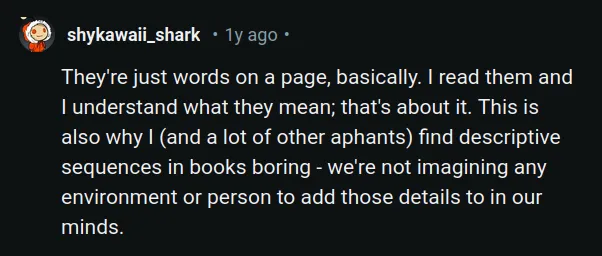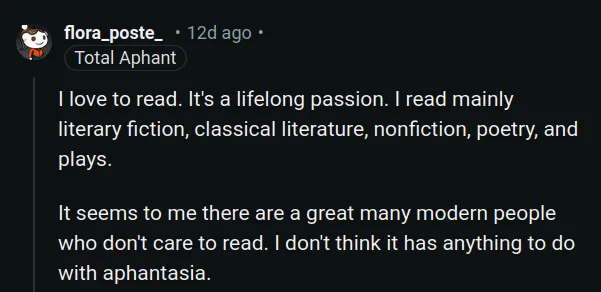Reading Blood Meridian with Aphantasia
What it feels like
Marco Giancotti,

Marco Giancotti,
Cover image:
Photo by Artem Maltsev, Unsplash
The universe is no narrow thing and the order within it is not constrained by any latitude in its conception to repeat what exists in one part in any other part. Even in this world more things exist without our knowledge than with it and the order in creation which you see is that which you have put there, like a string in a maze, so that you shall not lose your way. For existence has its own order and that no man's mind can compass, that mind itself being but a fact among others.
— Blood Meridian, Cormac McCarthy
In a recent survey experiment, Williams and Suggate (2024) compared the reading experience of people with different abilities to form mental images. They had three groups of participants: people with "normal" mental imagery, people with extremely good mental imagery (hyperphantasia) and people with no mental imagery at all (aphantasia). They found that the biggest non-obvious difference between these groups was in the measures of "transportation" (into the story) and "emotional engagement" with characters and events.
This replicates the results of Speed et al. (2024), who found that "aphantasics were less likely to be engaged with, interested in, and absorbed in the story, and experienced reduced emotional engagement with and sympathy for the story characters, compared to controls." Wicken et al. (2021) have also shown that people with aphantasia have a "flat-line physiological response (skin conductance levels) to reading and imagining frightening stories," meaning that they lack the automatic excitation of nerves that is usually associated with fear.
In other words, there is mounting evidence that people like me, who see nothing at all unless it's actually in front of their eyes, have a different relationship with literature from the other groups. It certainly seems so if you look at r/aphantasia, a large forum about the condition. Most aphantasics there seem to agree that descriptive text is boring because we can't picture it in our minds.



My own opinion is mixed. Like many other aphantasics, I love reading both fiction and non-fiction, and I do it all the time. But do descriptions throw me off? I'm not sure. Sometimes they do, sometimes they don't. I don't usually skim over description-rich pages, though. Just as I was wondering about this and hoping to bring clarity to the matter, I realized that I had already begun the perfect test without even realizing it. I happened to be reading a book titled Blood Meridian, or The Evening Redness in the West, by the late Cormac McCarthy.
A Bloody Good Case Study
Blood Meridian is something else. Ignored by critics for a while after its publication, it later came to be called one of the great American novels of the 20th century. Harold Bloom, a famous literary critic, said more than once that it is possibly the greatest American novel by a (then) living author, and wrote at length about how it is a worthy successor to classics like Melville's Moby Dick and Faulkner's As I Lay Dying. It tells of a gang of mercenaries roaming the Texas-Mexico border in the middle of the 19th century, hunting down Apache and Comanche Indians on behalf of the Mexican government. The book is very experimental in terms of style, eschewing most punctuation and several rules of grammar, but also in terms of the narrative tone itself, which hammers at you with one harrowing and horrifying event after the other as if to check your endurance. The people who like it are willing to be scalped alive to defend it, and the people who don't are usually nauseated and repulsed by it for life.
Blood Meridian has two qualities relevant to my question about aphantasic reading. First, this novel is famous for being one of the most "graphically" violent ever written. No one is spared from a gory and ignoble death—indigenous people, Americans, Mexicans, men, women, elderly, children, newborn babies, animals, you name it—although some have it delayed with suffering and mutilation.
Second, it is also filled to the brim with long environmental descriptions. There is very little dialogue in the book, the action is short and sparse, and most of the time the characters are trudging through a barren and hostile environment, short on water and often wounded and hunted by murderous enemies. (I must have read variations of the words "they rode on" and "they moved on" at least fifty times between those covers.)
This sounds like the ideal case study for emotional engagement and the role of mental imagery.
Before this, I had only read another novel by McCarthy, The Road, and I had liked it well enough to try another one. It was harrowing in its own right, but totally manageable. I was aware that Blood Meridian was considered a must-read by his fans, and I already knew that it was ridiculously bloody. So when I finally picked it up, I was mentally prepared for it. I didn't expect to like it very much, though, because of what sounded like a gratuitous and meaningless use of violence.
Who am I kidding, I wasn't prepared for it at all and I loved it.
How I Read It
Although Blood Meridian sort of has a plot, it didn't feel like that to me. It felt like an experience I was going through, a gritty and realistic nightmare I could opt out of at any time but chose not to. Except I do see stuff in dreams sometimes (aphantasia doesn't prevent that), and I didn't see anything at all while reading this book.
The brutal violence was a major element on every other page, as I had expected. And—also expected based on the scientific papers I cited above—it didn't bother me too much. While reading those descriptions of heinous acts against the innocent, I didn't feel like I was seeing them. They were not anywhere near me, even though I felt fully immersed in the story.
That is not to say that those scenes didn't affect me at all. My reaction was one not of anger but of resigned disappointment towards humanity. Did I feel horror? I would say so, but is it the same kind of horror felt by a person capable of visually playing the scene in their mind? I have no way of telling, but in my case it was an abstract horror, an incredulity that a human being may be capable of doing those things. And sadness. A sense that this is wrong, that it should never be allowed to happen, yes, but not a visceral or physiological reaction. It feels important but remote, not something related to me personally. Kind of like observing the events from a flying bird's (metaphorical) eyes—more than far enough for objectivity, but keen enough to take it all in.
What I found is that the violence was indeed gratuitous, needless, existing for its own sake most of the time, but that was the whole point of the novel. This is not a story of a character fighting for a good cause, with violence as a regrettable side-effect—it's a statement about the infinite ruthlessness of the world, a cynical view on the incurable evil of human beings. For this reason, the act of reading it felt meaningful and necessary, even if the events themselves didn't. Violence is the story. McCarthy's genius was in finding a compelling way to tell it.
Still, there is much more to Blood Meridian than the blood. I will not get into the themes, the philosophy, or the characters here, and instead limit myself to an example. There was only one passage, out of 353 dense pages, that made me pause reading for a moment, in order to take it in a bit at a time. It was a sentence uttered by Judge Holden, the central character in the book and one of the most terrifying villains I have ever known:
Whatever exists, he said. Whatever in creation exists without my knowledge exists without my consent.
If you haven't read the book, this probably sounds underwhelming after all those mentions of shocking deaths. Yet, when it sneaked up on me while reading, it was like a punch in the stomach. I literally laughed out loud from nervousness. I may have gone as far as swearing, rather uncharacteristically. This is the power of McCarthy's writing: he puts you in a queer state of mind where the implications for the state of the universe of what's going on, more than the immediate magnitude, become painfully important for you, the reader. Even an action that looks innocuous enough—the judge's derailed monologues, a member of the gang suddenly missing, an indecipherable movement on the horizon—feels important, ominous. Like another convincing sentence against your species. The narrator explains nothing and gives no background, so you find yourself constantly guessing about their significance, and trying to form a theory about what this all means, all the scary ramifications. I found this state to be cathartic and refreshing.
The same holds true for things that you're pretty sure have no bearing on the characters' fates. This takes us to the many descriptions of deserts and mountain ranges of Blood Meridian.
Strictly speaking, the descriptions are superfluous, because the author could just as well remove them and still be able to tell the same story. But thinking in this way means giving more importance to the story than the author intends. As I wrote above, his job is to put you in a specific state of mind, to take you through an experience. His descriptions are an important tool for that, and he achieves the goal thanks to his beautiful, heart-wrenching prose. For me, it works. I love it, and I suspect that other aphantasics (and not) would appreciate it too.
It may be useful to compare a descriptive passage from this book with one from another author. An example that often comes up when aphantasics complain about boring descriptions is Tolkien's The Lord of the Rings. Even though Tolkien is another one of my favorite authors, and I'm a big fan of his books, I have to admit that his descriptions aren't his greatest appeal for me. They fall flat with me a lot of the time. Here is an extract from the first book of the trilogy, The Fellowship of the Ring:
The cold increased as darkness came on. Peering out from the edge of the dell they could see nothing but a grey land now vanishing quickly into shadow. The sky above had cleared again and was slowly filled with twinkling stars. Frodo and his companions huddled round the fire, wrapped in every garment and blanket they possessed; but Strider was content with a single cloak, and sat a little apart, drawing thoughtfully at his pipe.
And here is a similar situation from Blood Meridian:
He's left behind the pinewood country and the evening sun declines before him beyond an endless swale and dark falls here like a thunderclap and a cold wind sets the weeds to gnashing. The night sky lies so sprent with stars that there is scarcely space of black at all and they fall all night in bitter arcs and it is so that their numbers are no less.

Clearly, these are two very different books, written in different times and with different sensitivities. Still, to me, McCarthy's description of nightfall is so much more satisfying, so much more immersive than Tolkien's.
The hobbit passage is just that, a passage among others that can be safely forgotten by the time you get to the next page. Night has come, the stars are appearing, and the characters are huddling around the fire. That may be a pleasant and effective little snapshot if you are able to picture it in your mind. You might mentally fill the sky with beautiful constellations, and contemplate this restful atmospheric moment with your inner eye. But for someone with aphantasia, it's just some information about the time of day and about the presence of things that I could have guessed were there anyway: stars, clouds coming and going, the characters sitting around a fire. It's not bad, but it doesn't give me much to work with.
The second passage, on the other hand, makes me feel things. Darkness doesn't just "come on", it "falls here like a thunderclap". It's not an abstract "cold" that "increases", but "cold wind" that "sets the weeds to gnashing". The sky doesn't just "fill with twinkling stars", it "lies so sprent with stars that there is scarcely space of black at all". Every single expression is carefully crafted, making sensory, almost synaesthetic connections and dynamic similes that actually work for me. Everything is moving, and I understand movement even without the aid of vision. Without the need to see or hear it in my mind, I know what it feels like for something to be "like a thunderclap": it's surprisingly fast. Similarly for the other expressions. They go beyond merely stating the presence of something, and help you evoke the sensations bypassing the need for visual simulation.
While reading this book, I often felt tired and jaded. At times, the many long descriptions of murders and of wilderness odysseys made me grow numb to it all (which, I suspect, is precisely what the author wanted). But I never felt the urge to stop reading, as some people claim they did. When I was done, I didn't feel scarred, but certainly changed.
While I can't say for sure, I think that aphantasia might have played a big role in how I experienced this novel, for better or for worse. I wrote that I felt "immersed" while reading, and also that I felt a certain distance from the scenes unfolding textually. That sounds a little paradoxical. How can one feel immersed in the story when they can't play it back in their head like a movie? I don't know, but I have some ideas.
Perception without the Cheese
I grew up in Italy and ate pasta almost every day for some twenty-six years. There was one fundamental truth I lived by all those years: tomato sauce pasta is complete only once you've sprinkled a generous dose of grated Parmesan cheese on top. It was a belief that never wavered, never in doubt. Then I moved to Japan, and was appalled to find that most Italian restaurants brought me cheese-less pasta. I couldn't accept it. I must be mistaken, I thought, and I tasted the sauce to see if, by any chance, the cheese was simply hidden somewhere out of view. It was nowhere to be found. Eventually I got used to it, and you know what? It's fine. It's still pasta after all, and I can make my own with cheese at home.
This is what I think perception is like, based on my careful observations. Everyone thinks that it's a single process, but we, the inhabitants of Aphantasia-land, know deep down that it's actually two separate things.
(As a disclaimer, my observations are entirely subjective and thus unscientific, but they seem to be somewhat compatible with what I understand about the neuroscience of visual processing, which works by levels of abstraction. Who knows, maybe someone will read this and provide a more accurate explanation.)
I think there are actually two separate steps in conscious perception, one which I'll call "attention" and another one which I'll call "interpretation". When you and I look at something, these two processes happen together, like pasta with cheese. The difference arises when imagining things.
"Attention", in my definition, is the passive acceptance of sensory data. The optic nerve (and any other sensory nerve) takes data from your senses to your brain, processed into a coherent representation, and you become conscious of it. The sensory data is agnostic to meaning and vastly more detailed than you can possibly acknowledge. You can scan it and peruse it while it lasts. Some of the patterns in this incoming data may trigger automatic responses and fast-moving emotions like fear and attraction, but only at a very basic and unconscious level.
The other step is "interpretation", by which I mean the active work of incorporating the sensory data into your conscious understanding of reality. This is where you update your model of the world, massaging both the new information and the things you already knew so that they fit in well together. It's also where you begin to consider the consequences and ramifications of this update. (This probably happens both at the conscious level and at the unconscious or instinctive one, but I won't worry about that distinction too much here.)
Now, these two steps always happen together when a person, aphantasic or not, actually perceives something with their senses. And, as far as I can tell, people capable of mental imagery also do them together when imagining things. When they read Tolkien's passage above, for example, they apply their "attention", at least in part, to the mental representation of the starry sky and the campfire. They also "interpret" these images and the other more abstract and non-sensory information given by the text.
My conjecture is that aphantasics only have the "interpretation" step when they read, and mostly at the conscious level. This removes the knee-jerk reactions and the more visceral emotions, because there isn't a direct sensory experience to induce them, but it doesn't spoil the pleasure of a good description. A good description is meaningful, and as such it is capable of evoking emotions non-sensorially. It picks at the strings of the semantic web inside my head, and that is how it can make me feel something.
With Tolkien's description, the information is too flat and generic to evoke much in me. I've seen the sky clearing of clouds so many times in my life, in so many variations, that reading "the sky above had cleared" doesn't point me to any specific emotion. Reading that the stars "fall all night in bitter arcs and it is so that their numbers are no less" is much more nuanced and unique, and includes not only a dynamic fact about what happens, but also a reflection about the mysterious nature of those phenomena. I don't need to see shooting stars in order to remember the awe of looking at them and pondering where they might go. The use of the word "bitter" here is a little unsettling, but it tells me about a specific worldview, and I can simulate staring up at the night sky in a similar mood. Having images would be nice, but it would be like the Parmesan powder on my pasta: a tasty addition to what exists as its own, delicious plate.
Enjoyment Not Diminished
Reading with aphantasia, then, is not so different from reading without it, after all. The lack of imagery, in my view, dampens the more instinctive reactions, and makes the reading experience feel relatively more detached from my body. Because of that, certain kinds and styles of writing—the styles that lean on those sensations to work—come out a diminished. The bulk of the meaning-making work, though, remains intact. Certain writers, like Cormac McCarthy, rely less on the reader's "attention" work, instead speaking directly to their "interpretation" process. This doesn't make them inherently better, and saying so would be presumptuous of me. They just tend to work better for at least some aphantasics.
On the other hand, I imagine that there are cases in which the mental imagery may actually get in the way. Violent scenes might be one such case, because a strong visualizer could be so shocked and disturbed by the scenes being depicted that they lose track, miss other important details, or become unable to enjoy the other aspects of the narrative. If this does happen sometimes, it would represent an advantage for aphantasic readers.
Of course there are many other sides of a novel that one can like or dislike. The fact that the prose in Blood Meridian worked very well for an aphantasic mind like mine doesn't mean that all aphantasics will surely like the book. Things are fortunately more complex than that.
But I will venture only one confident assertion: an aphantasic who blames aphantasia for their not liking any kind of fiction or descriptive text is almost certainly wrong. Don't listen to me. The science says so:
Finally, our results indicated that imagery level was not strongly related to reading enjoyment.
This suggests that experiencing a story via visual imagery is not the only way in which stories can be enjoyed.
And many other bookworms with aphantasia say so:



Now, if you haven't read Blood Meridian yet and it sounds intriguing (even if a little scary), I recommend you give it a try. Whether you have pictures in your mind or not, I think it has something to offer to you. ●
This post is included in the List of Introspective Descriptions.
Cover image:
Photo by Artem Maltsev, Unsplash
